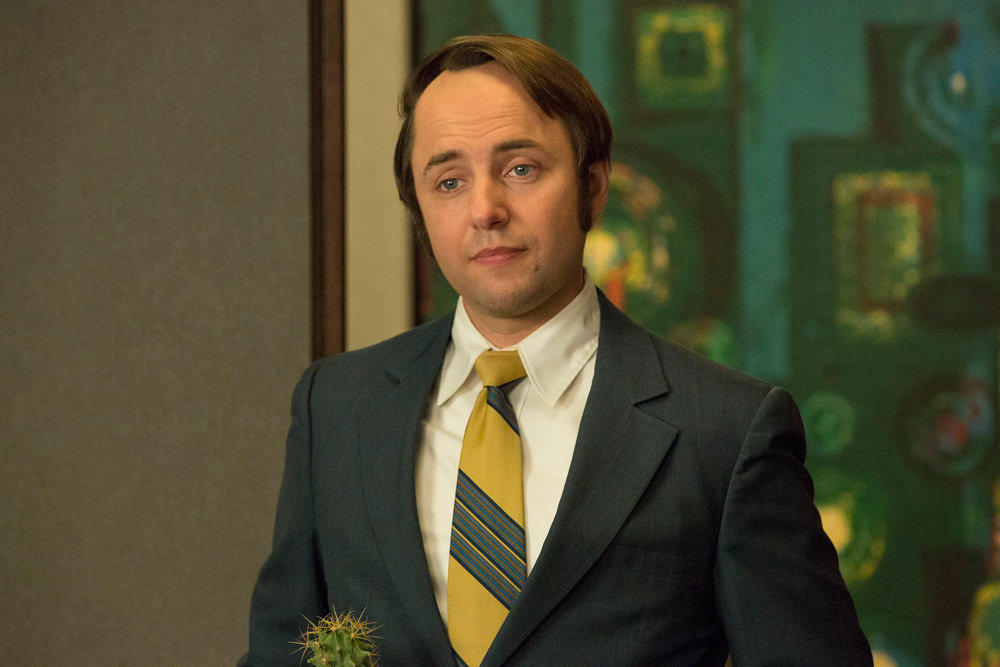Well, there it is. There’s the question that’s probably going to hang over every discussion of Mad Men from now until people forget that Mad Men ever existed. Namely, did Don dream up one of, if not the most famous advertisements of all time, the one officially titled “Hilltop,” but that entire generations know as “I’d Like to Buy the World a Coke?” Or did he reach some form of inner peace at the end of a long, hard journey in the unlikeliest manner possible? Was that final mysterious smile one of contentment and growth? Or a realization that he’d just came up with the killer idea that’s not only going to save, but define his career? It’s the “Were they in Purgatory the whole time or not?” of Mad Men. Or probably more accurately, considering Matthew Weiner’s resume, the “Does he get killed when the screen goes to black or not?”of Mad Men. Did Don change or didn’t he? Can people change or can’t they? That’s been the question at the heart of the series since its very beginning, and in typical Mad Men fashion, it didn’t answer it for us at the end. Instead, it posed the question and studiously avoided providing a definitive answer. You could look at that and be frustrated by it or you could take it for what it is and in the manner in which we think it was offered: as an opportunity to examine your own reactions and conclusions, rather than having the show tell you what you’re supposed to think.
Because ultimately, whichever interpretation you choose to believe says something about you. Is real change possible or is the cynical exploitation of the attempt to change the best you can hope for from people? Let’s unpack this. After everything Don’s been through, and having learned not only that the mother of his children is dying, but that she doesn’t want him to raise their children after she’s gone, Don (as per usual) puts himself through the wringer, hits rock bottom and:
a) Achieves a form of inner peace. The final shots of the Coke ad can then be taken as a statement that regardless of Don’s personal journey, the game of advertising, the business of commodifying people’s fears and desires in order to make corporations richer, continues on, churning out highly evocative and emotionally rich advertisements without Don Draper there to dream them up. Life goes on, but Don is heading in a new direction, having fully shed the past. This could be seen as tying in with Leonard’s tearful monologue about being a product on a shelf inside a refrigerator; one that fears he doesn’t know how to recognize or accept love in his life – or even if he deserves it at all. Like the ad business, the angst of middle-aged white guys and their inadequacy issues churns on, regardless of whether Don Draper is taking part in it or not. Don learns he is merely one small part of the universe and after decades of self-torture, that brings him a form of comfort.
Or:
b) He dreams up the Coke ad there on the spot, based on everything he’s experienced recently, which is perfectly par for the course with the Don Draper we’ve been watching for the last 8 years; the one whose very best ads have always come from some deep place inside himself. This is the man who checked out of his own life to try and save Diana, who abandoned her child. And when he couldn’t make that happen, he tried to save Stephanie, who also abandoned her child – and who also ran away from his attempts to save her, like Diana did. And of course, this is the man who was told by the mother of his own children that she didn’t want him raising them after she’s gone. This is the man who feels and experiences all of these things, who fails over and over again at bringing or keeping families together, and turns them into “I’d like to buy the world a home and furnish it with love” in order to sell more soda to the American public, because that soda is “The Real Thing,” of course. It’s “what the world wants today.” He will win awards, become a legend of the advertising industry and the Golden Boy of McCann-Erickson, make even more money, and live happily ever after – at least until the next emotional crisis comes along and he has yet another meltdown because he hasn’t effectively dealt with all of his shit, still drinks too much and only sees his abandoned children sporadically. But who knows? Maybe the next breakdown will give the world “I Heart NY.” Or the Reagan presidency. Don Draper will continue ever on, unchanged, but still a genius in his own way, plumbing the depths of his psyche to sell more sugar water.
So which one’s it gonna be, hotshot? Hope or cynicism? Note that both interpretations end roughly at the same conclusion: Life goes on, which can be taken either as a hopeful sentiment or an ironically fatalistic one. How very appropriate of Weiner to end the show this way and on these questions. Of course we’re writing this in the middle of the night, hours after the episode aired. For all we know, by noon tomorrow, Weiner will be giving interviews to the New York Times giving the definitive answer to the question. At the very least, it comes across intentionally vague. Then again, we were surprised Weiner ended the show by implying that the fictional Don Draper might actually be responsible for the rightly praised work of the very real Bill Backer, considering he’s said more than once that he had no intention of taking credit away from the real work of real people. All bets are off, apparently.
But without coming right out and saying so, the episode was constructed in such a way as to make you seriously consider that Don was taking inspiration from his own experiences to come up with the legendary ad; from Peggy pleading with him to come home (“I’d like to buy the world a home”) to Leonard’s feeling that his family didn’t love him (“and furnish it with love”), to the ethnically diverse grouping of hippies on a hilltop with him at the end, and even to some sly costuming winks. We’re inclined to believe that Don didn’t really achieve any form of true enlightenment. He had another breakdown, ran away, hit rock bottom again, and then used that to come up with a killer ad. It’s what he’s always done. And the idea that he did it again here, even as he was facing the destruction of his own family, and did it better than he’s ever done it before, tells us that Don Draper will never truly change. That wasn’t enlightenment at the end; it was capitalism, grinding ever on.
Now, it’s possible that Don cynically turned his experiences into the Coke ad while at the same time reuniting with his children under one roof and learning to accept love in his life, but that seems extremely unlikely given that utterly heartbreaking conversation with Betty, where they both come face to face with the truth of how limited a man Don Draper is. “I want to keep things as normal as possible, and you not being here is part of that.” It could have come across like a bit of a bitchslap, but it really was just the wearying truth of the matter. From Betty’s perspective, Don couldn’t possibly be counted on to be a father to his children. And while we think a lot of how this series ended could be open to interpretation, we simply cannot fathom an ending that has Don enlightened, unburdened of the past, a loving father to his children AND at the very top of his game in the advertising world. That’s just not how Matthew Weiner sees things, nor would such an ending be true to the show.”What did you ever do that was so bad?” Peggy asks him. “I broke all my vows, I scandalized my child, I took another man’s name and made nothing of it,” Don replies succinctly. “That’s not true,” Peggy offers weakly, but it is. All of it is. No, as we see it, either Don gave up everything – including his children – in order to find some sort of peace or he went right back to the remains of his old life largely unchanged and wrote the best ad of his career. We are inclined to think it’s the latter, but we’ll enjoy hearing other people’s interpretations of the former.
In other Mad Men news, it seems several of the characters really are capable of forging change in their own lives. Peggy and Stan finally give their shippers the ending they so desperately wanted. We admit, we found the scene of them declaring their love to be incredibly charming, but ever-so-slightly off-model for the show. It can be forgiven simply because final episodes have some leeway to break a bit outside their own molds and besides, their scene together was the most emotionally satisfying of the finale. We literally clapped. “There’s more to life than work,” Stan tells her, and for once, she follows that line of thought. Sure, it was fan-service, but if one character truly deserved some emotional happiness above any of the others in this show, it’s Peggy.
And besides, it wasn’t the only fan service moment of the night. To our surprise, the episode was loaded with crowd-pleasers, from Roger putting Kevin in his will and having a lovely final moment with his pseudo family (“Rich bastard. Hey, I guess he really is one.”), to Joan excitedly trying to get Peggy on board with Olson Harris production company, to Pete telling Peggy that some day, in the far off wilds of 1980 perhaps, she would have her name on the lobby wall and people would brag that they got to work with her. One after another, our characters got to say awesome things to each other in a way that felt final and emotionally satisfying. Like the implication that Don authored a legendary real ad, the finality of these scenes was extremely surprising to see. Weiner, it seems, confounded everyone’s expectations and gave them a finale that really felt like an ending.
We got to see the Campbell family get on a Lear Jet like a trio of rockstars, living the life they felt they deserved, which is, we think something of a theme tying most of these stories together. Everyone got the life they thought they deserved. Don wants to unburden himself from his sins AND write a killer ad. Roger wants to be truly and hopelessly in love with a woman who gets him and who challenges him. Pete wants to be recognized as a brilliant businessman and be treated like a king. Peggy wants to do great work and be with a man who truly understands her and loves her. And Joan? Joan wants what’s best for her and her family, like she always has. It’s interesting to note what Peggy and Joan had to give up to get what they wanted. Peggy gave away a child to pursue the life she wanted and Joan had to watch no less than four different men walk out her door over the last decade before she realized her own potential and how much better off she can be when she does things her way.
These were true fist-pump moments in their own way, even if there was some disappointment. After all, Joan really wanted Richard in her life and Peggy had to say no to a serious offer to launch a company and have her name on the wall, but there’s no doubt they’re both better off with the decisions they’ve made. Frankly, when Joan pitched the idea of a partnership with Peggy, we had serious doubts, considering how many arguments they’ve had over the years. No, Joan’s better off launching her company on her own, with the help of her ever-present mother and letting the business – Holloway Harris – bear both their names instead. She may not have it all, but she’s doing it on her terms, with her family by her side. “Your life is undeveloped property,” Richard told her. “You can turn it into whatever you want.” And so she did. Without him or his help.
The only true tragedy in the story is Betty and her children, and no amount of fist-pump moments can make up for that grim scene of Sally doing the dishes while her mother smokes the remainder of her life away. Most of the characters got relatively happy endings and Don remained the Don we’ve always known (if you see the ending the way we do), but this being Mad Men, someone had to pay the price, and it seems somehow perfectly appropriate that after all this, it’s the remainders of Don’s family who suffer the most.
We’ll leave things there for now and save our final, final thoughts for our final, final Mad Style.
If you’d like to hear our interview with Mad Men’s Costume Designer Janie Bryant, you can go here (4/3/15 podcast).
For more discussion on your favorite shows, check out our TV & Film forum.
[Photo Credit: Michael Yarish/AMC]
Mad Style: The Milk and Honey Route Next Post:
First and Last Looks at Mad Men
Please review our Community Guidelines before posting a comment. Thank you!




